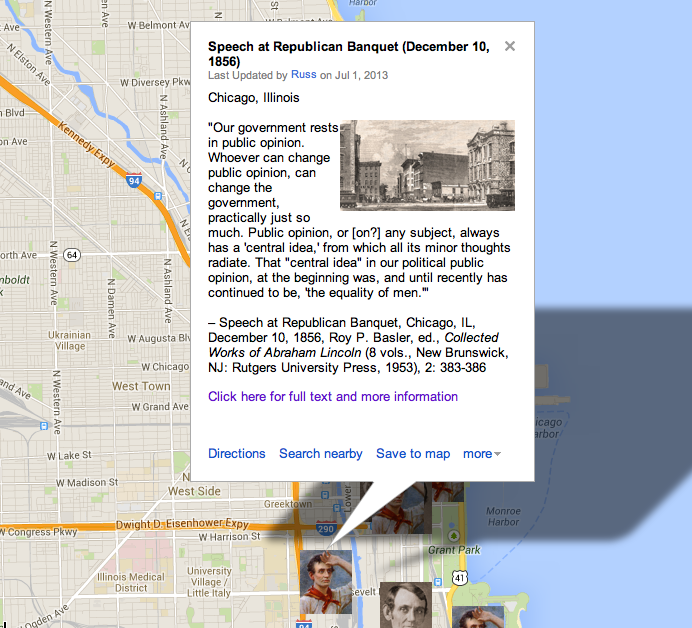Contributing Editors for this page include Kory Loyola
Ranking
#63 on the list of 150 Most Teachable Lincoln Documents
Annotated Transcript
On This Date
HD Daily Report, December 10, 1856
The Lincoln Log, December 10, 1856
Close Readings
Kory Loyola, “Understanding Lincoln” blog post (via Quora), September 29, 2013
Custom Map
How Historians Interpret
“This eloquent address helped clinch Lincoln’s reputation as the leader of Illinois’ Republicans. A correspondent of the Illinois State Journal declared: ‘There is no man upon whom they would so gladly confer the highest honors within their gift, and I trust an opportunity may not long be wanting which will enable them to place him in a station that seems to be by universal consent conceded to him, and which he is so admirably qualified by nature to adorn.'”
“Buchanan won the 1856 presidential election because the anti-Nebraska supporters split between Fillmore and Frémont. Republican William Henry Bissell was elected governor of Illinois. On December 10 at a postelection Republican banquet in Chicago, Lincoln delivered an inspirational speech to members of the base he had helped to create, and an examination of the speech shows he ultimately had more than a celebratory purpose and more than just Republicans in mind. The speech reflects the increasing diversity of Lincoln’s political rhetoric: it emphasizes the themes of liberty and union, the immorality of slavery, folksy humor for satiric effect, problem analysis, numeric analysis of voting, refutation, solution development based on his political-social philosophy, and exhortation. The speech includes the stylistic techniques characteristic of Lincoln’s well-crafted writing, including antithesis, metaphor, and anaphora. In this speech, Lincoln famously observes that public opinion shapes American government and that ‘whoever can change public opinion, can change the government.’ He quotes Buchanan’s accusation that Republicans are trying ‘to change the domestic institutions of existing states” and “doing every thing in our power to deprive the Constitution and the laws of moral authority.’ Lincoln, rather, says the Democrats are the ones who are trying to shift from the American principle of ‘the practical equality of all men’ to ‘the opposite idea that slavery is right.’ Lincoln denies that the majority of Americans believe slavery is right.”
—D. Leigh Henson, “Classical Rhetoric as a Lens for Reading the Key Speeches of Lincoln’s Political Rise, 1852-1856”, Journal of the Abraham Lincoln Association 35, 2014.
“As ‘the central idea’ of the regime, the principle of equality was axiomatic to popular government. ‘Our government rests in public opinion,’ Lincoln explained. ‘Whoever can change public opinion, can chance the government, practically just so much. Public opinion, or [on?] any subject, always has a ‘central idea,’ from which all its minor thought radiate. That ‘central idea’ in our political public opinion, at the beginning was, and until recently has continued to be, ‘the equality of men.’’ Lincoln sought to educate public opinion in accordance with this great truth. Indeed the norm of equality was the moral compass whereby he navigated the ship of state.”
—Joseph R. Fornieri, Abraham Lincoln, Philosopher Statesman, (Carbondale: Southern Illinois University Press, 2014), 15.
NOTE TO READERS
This page is under construction and will be developed further by students in the new “Understanding Lincoln” online course sponsored by the House Divided Project at Dickinson College and the Gilder Lehrman Institute of American History. To find out more about the course and to see some of our videotaped class sessions, including virtual field trips to Ford’s Theatre and Gettysburg, please visit our Livestream page at http://new.livestream.com/gilderlehrman/lincoln

